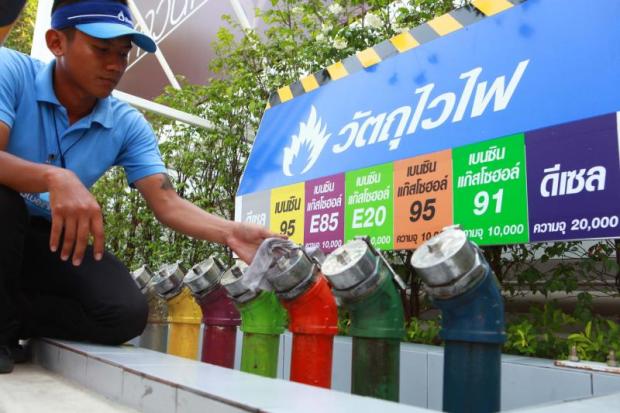
Mismanagement among ethanol factories and a delay in molasses production this year is likely to cause an ethanol shortage this month, for the first time in several years, according to the Energy Business Department.
Director-general Witoon Kulcharoenwirat said the government needs a plan to prevent a potential ethanol shortage as major oil retailers, including PTT Plc, Shell and Chevron, have raised concerns about the potential shortfall of ethanol.
The three major fuel retailers have asked the department to start using ethanol reserves, which would be sufficient for 3.5 days.
Mr Witoon said Thailand produces an average of 4 million litres of ethanol per day but daily consumption stands at an average at 3.6-3.8 million litres per day.
Some oil retailers fear the shortage will span 5-6 days as demand for petrol rose 14% over the first 10 months of this year, pulling up demand for ethanol, which is blended in every type of petrol.
The department will discuss possible solutions with major oil retailers next week.
In addition, the department will send its staff to closely monitor ethanol producers' production plan, stock, and distribution in order to manage the situation.
"We may allow oil retailers to use their ethanol inventories if there is any shortage, but concerns over ethanol shortage will reemerge when we enter the drought season," Mr Witoon said, referring to molasses and tapioca, which are major sources for ethanol production.
The development of biofuel officially started in Thailand a decade ago when global oil prices rose above US$100 a barrel, forcing the government to issue a mandatory asking oil retailers to blend ethanol with petrol in order to help reduce oil import expenses.
Governmental and industry officials have admitted there could be an ethanol shortage in December largely due to mismanagement of ethanol production as well as a delays of the sugar crushing season this year, which consequently delayed the production of molasses, a byproduct of sugar that is a raw material for ethanol.
Deputy director-general Wisak Watanasap said the major reason of the shortage is that major molasses-made ethanol manufacturers have shut down their production for maintenance at the same time, resulting in substantial fall in ethanol production over the past few months.
"We will discuss with producers and set up an agreement where they will not shut down at whim again," Mr Wisak said. "The maintenance shutdowns should be discussed before taking place in order to secure the country's energy supply."
Another cause of the ethanol shortage is the delay of Thailand's 2016-17 sugar crushing season, which also delays molasses production, according to Sirivuth Siamphakdee, honorary president of the Thai Ethanol Manufacturing Association.
Thailand's sugar crushing season normally starts in early November. This year's crushing season was delayed by unfavourable weather that disrupted the sugarcane harvest.
"Normally, molasses output comes to the market 16 days after the start of crushing season," Mr Sirivuth said.
"This year we needed to delay the crushing season, which also delayed the production of molasses, leading to the possibility of an ethanol shortage," he explained.
Thailand normally produces around 4 million tonnes of molasses a year. Around 1.2 million tonnes go to the liqueur industry and around 500,000 tonnes are exported, leaving around 2.5-2.7 million tonnes for ethanol industry.